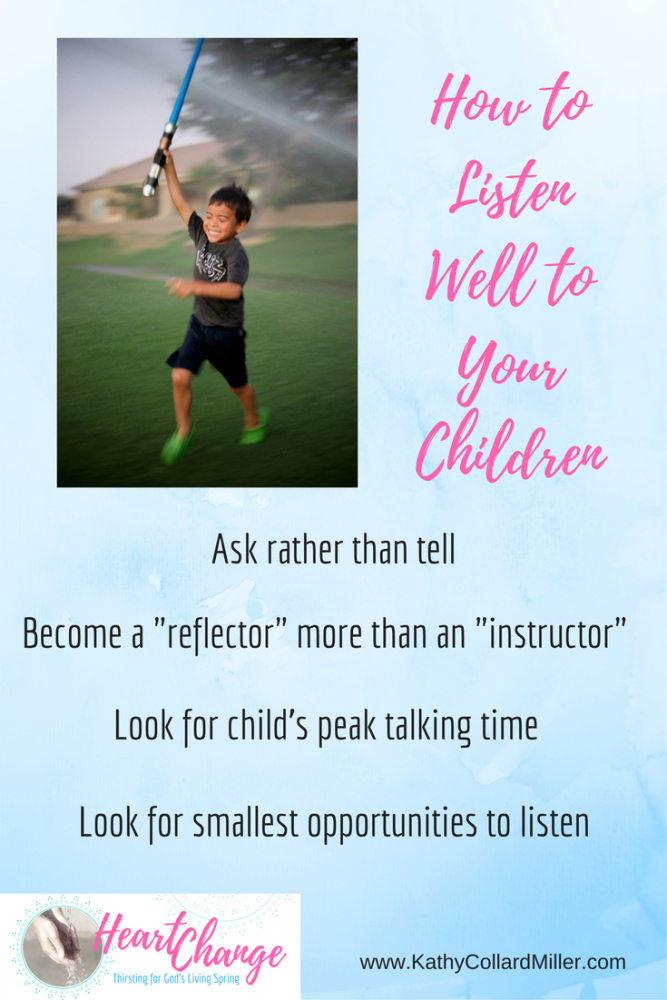 I remember many years ago when my then-twelve-year-old daughter and I attended a mother-daughter retreat. I forget what prompted our discussion but she confronted me saying, “You don’t listen to me before you make a decision on my requests.”
I remember many years ago when my then-twelve-year-old daughter and I attended a mother-daughter retreat. I forget what prompted our discussion but she confronted me saying, “You don’t listen to me before you make a decision on my requests.”
I knew it was true. I was formulating my answer and had made the decision already. After she shared that with me, I began truly listening and it was a turning point in our relationship.
Here are some ways we may not be aware we are communicating disinterest in our child’s words:
- not looking at her when she speaks.
- showing a facial response indicating “I’m really thinking about something else.” It really is possible to have a distracted look on your face.
- continuing to be busy and not stopping what you’re doing.
- rolling your eyes.
- finishing your child’s sentence or nodding impatietly as if you know already what he’s going to say.
- automatically saying, “I know just how you feel.”
- responding with a look on your face that does not match the emotion your child is expressing.
I’ve done all these things! My children are adults now and I can look back and see the problems. But I did begin to put into action some helpful responses for listening well.
Ask rather than tell
Most of us as parents are better “tellers” than “askers.” We naturally give instruction and remind our children, which can easily become nagging. Rather than only telling, we can reach into their heart’s motives and their mind’s thinking by asking questions, like,
- What were you thinking when you forgot to pick up your clothes?
- Why did that seem like a good idea at the time?
- What do you love about that activity?
- What do you like about being with that friend?
Larry and I learned that if we took our two children out for dinner to a restaurant and not fast-food, they were a captive audience. Oh wait.. Larry and I were a captive audience. The whole point was that they couldn’t run off and not talk like they did often at home.
Strange, eh? We wanted to be the captive audience.
By the way, we didn’t have to compete with cell phones and social media when our children were young. Consider making dinner time, wherever you are, a “no phone zone.” But you must have the same rule apply to you.
When your child is a teenager, become a “reflector” more than an “instructor”
I followed Proverbs 18:13: “If one gives answer before hearing, it is folly and shame.”
When my children reached their later teenage years. I began to say something like, “I know I don’t communicate I’m truly listening. I love you so much I just want to tell you what you should do and not listen to your side. Here’s what I promise you. Unless I really judge you’re going in the wrong direction on something, I’m not going to offer advice without being asked. I’ll try to ask questions to help you think something through, and you can tell me when you’re ready for my input. If I can’t keep to this, you have permission to remind me gently about my promise.”
Obviously this isn’t for elementary kids when we should listen and offer help, even if they don’t ask. But the older your child is, the less you should be jumping in with instruction. Rather, ask questions that help him evaluate his own desires and thoughts. Most kids want the attention and advice of their parents. If we are listening well, they will invite us to offer wisdom after interacting with them with questions.
Look for your child’s peak talking times
For my daughter, it was right at bedtime. She is a night owl and guess what? I’m exhausted by the night time. Even though it was sacrificial, I chose to stay alert to hear her as she talked before sleeping. It was hard but it communicated I really valued her.
Look for the smallest opportunities to listen and respond
Deuteronomy 6:6-7 tells us, “Keep these words I am commanding you today in your heart. Recite them to your children and talk about them when you at home and when you are away, when you lie down and when you rise.” The point is: all the time! You never know when the opportunity will occur. Maybe we could paraphrase:
- Listen to them when you’re driving by turning off the radio
- Listen to them when you’re working side by side on some project
- Listen to them when it’s their peak talking time
- Listen to them when you’re wanting to use social media and it’s that moment they chose to talk.

Much needed reminders! Thank you, Kathy.
Thank you, Joy, I’m so glad you found it meaningful. We really do need reminders especially for things about parenting because it can become so overwhelming. Blessings to you, friend!